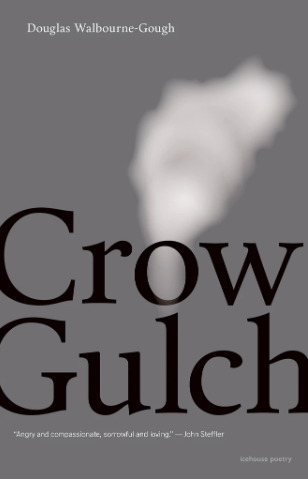
Crow Gulch
Douglas Walbourne-Gough
icehouse poetry, 2019.
Review by Kim Trainor
In a CBC interview about his debut collection Crow Gulch, Douglas Walbourne-Gough observes, “I would really hope one of the things that the book speaks, back to me and everyone who reads it, is to offer a counter-narrative to stigma.”
Walbourne-Gough addresses the stigmas of class and Mi’kmaq status in Newfoundland, through the lens of Crow Gulch, a former community on the outskirts of Corner Brook, Newfoundland. The community was located on the site of an old slate quarry and comprised mainly families of Mi’kmaq ancestry. Many of these families were relocated from Crow Gulch in the late 70s to the social housing project of Dunfield Park, known as “the Bean” because it was painted in bright paints that were the colour of jelly beans. The colours were meant to be cheerful, but instead served as further stigma for working class/Mi’kmaq inhabitants.
Walbourne-Gough, as signalled by his hyphenated last name and his self-description as “Mixed/adopted Mi’kmaw”, works in this space of hyphen and stigma by grappling with language, personal memory, and archival materials such as urban planning documents, oral histories of Crow Gulch recorded by Dr. Rainer Baehre, and an aerial photograph of the community which sprawls over the train tracks on a precipitous slope and is reproduced on the inside cover of the book. Ethnicity, class, labour, language are all mapped onto the spaces of geography and memory.
The poem “Definition,” which appears early in the collection, patches together a variety of definitions in the Dictionary of Newfoundland English for the word jackatar, which Wallace-Gough describes in his Introduction as a “derogatory epithet for Indigenous people of mixed French and Mi’kmaq descent.” The term is not reworked in this found poem; definitions and uses are simply presented in stark entries:
—[I] went to see a poor man who has been very ill for 7 months, he and all his family belong to much despised & neglected race called “Jack a Tars,” they speak an impure dialect of French & Indian, R.C.’s and of almost lawless habits.
The act of challenging and rewriting these usages is found instead in the narrative and archival techniques of the poems which surround “Definition,” and offer a commentary beyond the narrow confines of the Dictionary. These poems challenge derogatory erasures and rework them by telling stories about the community’s inhabitants, drawn from oral histories, family memory, and imagining. Resistance and rage are clear in the prose poem “Fuck this Town”:
This mill with all its money gone wrong. Fuck the cut-eyed stares and the stigma. Fuck the train and the tracks too, never done anythin’ but make us into thieves to feed ourselves […] Girls won’t even look at ya ‘cause you’re from Crow Gulch. I swear, too, the next bastard that calls me jackatar’s gonna get a good shit-knockin’.
By contrast, the poem “Ella and Rudy” foregrounds the importance of love as a force to reject such definitions by describing in humane detail and with humour the devotion of the poet’s paternal grandparents:
The few photographs of them together: kitchen
table, littered with bottles, ashtrays, stray playing cards.
Her slender hand holding a half-smoked Rothmans,
giant glasses magnifying her dark eyes, yet still outshone
by her grin. His thick hand draped lazily over her shoulder,
a wild look in his eye, ready to correct someone’s local
history. She’d let him speak, then tell how it really happened.
Many of the poems read in this way—like lineated micro fiction, deft in telling detail and anecdote. We learn more of Ella in the portrait “Ella Josephine Campbell.” On the nights she won at Bingo, “she dropped by the Padarnac Lounge to chat/ with her brothers, a quick rum’n’ coke –/ warms the blood for the walk home.” And also of Rudy: “His laugh like wolves’ teeth over gravel,/ topped with a gold canine. Idolized Louis/ Riel, loved Tina Turner. Thunderdome.”
Similarly, in the poem “Influences,” complexity of identity is articulated in a gentler ancestral vein by layering place with family history. It begins with pleasing long inventories of local haunts, fauna and flora—”partridgeberry, pitcher plant, Coppermine Cape,/ Woody Point, spruce grouse, Norris Point”—which then dilate to childhood memories of routines and popular culture expressed through details such as processed food drawn from food banks:
Skim-milk powder, baloney sandwiches,
snow through the gap in the doorframe
of our Dunfield apartment, frying chips
in lard on the stovetop, food-bank onions
and white rice in Ziploc bags, cans
of potted meat, cans of flaked ham…
It moves from these childhood memories to a genealogy of the poet’s family, and ends by describing the book’s project, figured as a dreaming or listening for the voices of ancestors in the crying of crows:
I sit in this canoe (am I dreaming,
again?) to glean their voices from
the cries of crows, a breeze through
black spruce, an old leather Bible,
costume pearls, rewriting all the
long-dead stories we keep repeating
that keep us disconnected,
circling ourselves.
In this poem, as in the collection as a whole, we find a reconfiguration of the archive, a rewriting of the hardships and the “long-dead stories” of Crow Gulch into poem.
Kim Trainor is the author of Karyotype (Brick Books, 2015) and Ledi (Book*hug, 2018), which was short-listed for the Raymond Souster Award. She lives in Vancouver.